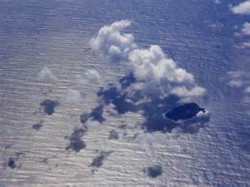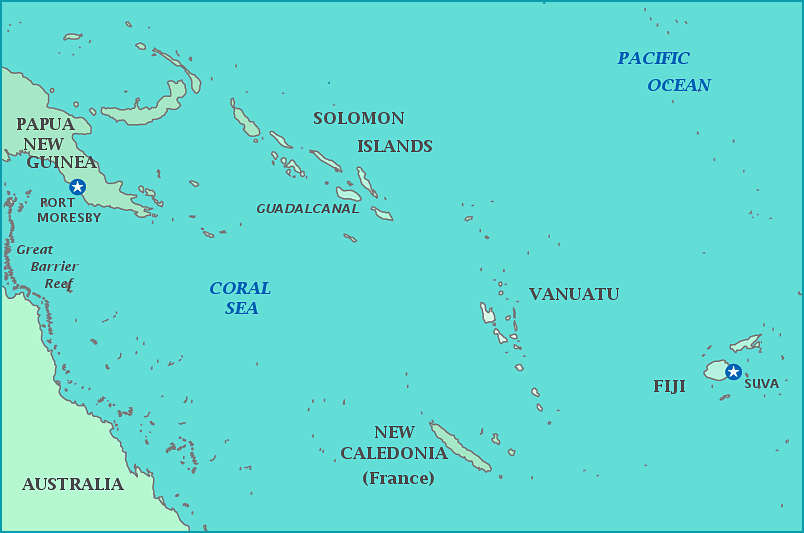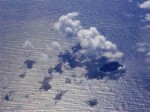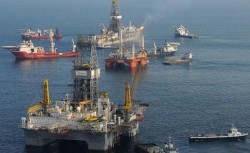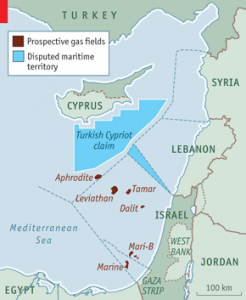Who knew that France is still involved in a conflict over South Pacific maritime boundaries? Tell the French that their opponent in the conflict is Vanuatu and many will answer “What’s a Vanuatu?”
Few French even know that France claims one of the biggest aggregate maritime territories in the world. Indeed, due to its numerous overseas departments and territories, France possesses the second largest exclusive economic zone (EEZ) in the world, covering 11,035,000 km², just behind that of the United States, with 11,351,000km².
Shinzo Abe, the Japanese Prime Minister, even said in June 2013, that “France is a big maritime power,” and that France and Japan should collaborate for security issues in the Asia-Pacific region. Following up this sentiment, during Japanese Foreign Minister Fumio Kishida’s visit to Paris, the two nations agreed to closer military ties.
Funny enough, France is never mentioned in Australia’s Defence White Paper 2013. And yet Spain is, despite lacking any territory in the South Pacific. France on the other hand retains French Polynesia, Wallis and Futuna, and New Caledonia, a territory with an EEZ as big as South Africa’s.
One of New Caledonia’s neighbors, Vanuatu, then known as the New Hebrides, was a Franco-British Condominium (a territory with shared sovereignty) from 1906 to 1980. Nowhere else on earth were two colonial powers sharing an island. (Well, they of course first competed for it, before deciding to rule it jointly.)
While the former colony maintained formal relations with France after gaining independence, two little inhabited rocky islands known as Matthew and Hunter became the cause of a maritime boundary issue between the two nations.
In 1976, prior to Vanuatu’s/New Hebrides’ independence, France annexed Matthew and Hunter islands to New Caledonia rather than keep them in the New Hebrides condominium.
The Vanuatu government of the time rejected French sovereignty over the islands and planted the Vanuatu flag on Hunter Island in 1993 but a French patrol vessel prevented the party from reaching Matthew Island. France nowadays maintains a naval presence and an automated weather station on Matthew.
In 2009, the Vanuatu Prime Minister and the independence movement of New Caledonia, the FLNKS, signed a document – with no legal value – recognizing the Vanuatu sovereignty over Matthew and Hunter islands. This gesture is all the more surprising given that France has always stated that the two islands belong to the territory of New Caledonia, and that Vanuatu’s economy is largely supported by French development aid, as well as aid from Iceland, Australia, Japan, New Zealand, and others.
But in Vanuatu, the legends associated with these southern islands demonstrate the importance of these two islands in the Ni-Vanuatu (Vanuatu people) tradition. Matthew is known as the “House of the Gods” where the spirits of the dead go rest. Ni-Vanuatu speak of traveling regularly from the islands of the Vanuatu archipelago to Hunter and Matthew, singing and dancing when they were on one or the other of the two islands in dispute today. On the other hand, there is no known legend of these islands in New Caledonia.
Vanuatu claims that the two islands are part of its archipelago based on its offered geological and cartographic evidence. Those two islets are even being fought for before the UN under terms of the UN Convention on the Law of the Sea (UNCLOS)
The dispute spilled has also unsettled relations with neighbors. In 1982, for example, Fiji and New Caledonia signed an agreement on mutual recognition of their maritime boundaries, in which Fiji recognized French ownership of the Matthew and Hunter Islands. The action upset Vanuatu, which demanded that Fiji recognize Ni-Vanuatu sovereignty over the islands, stating that failure to do so would be a blow to peace in the region, but Fiji did not revoke its signature.
Oh, I almost forgot: Hunter Island is also unofficially claimed by the micronation Republic of Lostisland, which undertook an expedition to the island in July 2012. Lostisland is an international project generally classified as a micronation, with citizens from all over the world aiming to achieve the independence and sovereignty of the Hunter Island. But the likelihood of it impacting New Caledonian or Ni-Vanuatu claims is nil.
For all the fuss, the Matthew and Hunter Islands are two little volcanic islets that look pretty boring from above. See for yourself:
Nor are they big – Matthew is 0.1km² and Hunter 0.4km². So why are they so important for France? Is it because they are a sanctuary for the terns and playground for the studies of meteorologists and ornithologists? Of course not. France dreams of extending its sovereign rights over an additional 2,000,000km².
But it is serious business – at stake are the exploration and exploitation of hydrocarbons and rare metals, as well fishery resources. The exact resource contents of these areas will have to be determined by further scientific studies. It is clearly a bet for the future.
To take advantage of these potential riches, France filed extension requests for fourteen geographical areas with the Commission on the Limits of the Continental Shelf of the United Nations in 2009. A special French interdepartmental program (steering committee composed of seven departments) called Extraplac was created in 2002 to prepare for all potential expansion areas, without studying fisheries or mineral resources. Extraplac could also present common issues with other coastal states sharing the same continental shelf.
But the extension of the continental shelf would involve substantial financial resources to ensure the protection and control of the newly acquired areas, but the deep cut in the finances of the Ministry of Defense does not make this possible at the moment.
A final problem exists. Article 121 of UNCLOS states that “rocks which cannot sustain human habitation or economic life of their own, have no exclusive economic zone or continental shelf.” However, the story of the inhabited Clipperton islet in the North Pacific with its 431,015 km² big EEZ shows that France, like many, has a broad interpretation of the ability to sustain economic life.
At the same time, Article 47 of UNCLOS states that an archipelagic State may draw straight baselines “joining the outermost points of the outermost islands and drying reefs of the archipelago provided that within such baselines are included the main islands.” As such a state, if Vanuatu can also claim Matthew and Hunter islands as part of its territory and archipelago, it would be able to draw its baseline to the islands and thereby extend its EEZ from the islands without concern for Article 121.
It’s important to note that the Commission on the Limits of the Continental Shelf is charged with making recommendations to states, based on scientific evidence, on demarcating continental shelves (thereby conferring rights) when these shelves exceed the standard 200nm EEZ. However, it is up to the states themselves to enact the recommendations and settle the territorial claims.
Pretty interesting stuff happens in the South Pacific, huh?
Alix is a writer, researcher, and correspondent on the Asia-Pacific region for Marine Renewable Energy LTD. She previously served as a maritime policy advisor to the New Zealand Consul General in New Caledonia and as the French Navy’s Deputy Bureau Chief for State Action at Sea, New Caledonia Maritime Zone.

